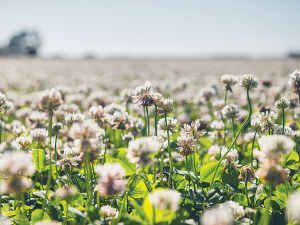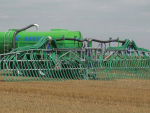Plant breeder Germinal has announced the release of the world’s first hybrid of white and Caucasian clover.
Called DoubleRoot, the company says it is a ground-breaking cross of Caucasian clover and white clover, the result being an efficient clover that can produce both above-ground stolons and underground rhizomes, “combining the advantages of both parent plants”.
Germinal says the technology represents a significant step forward as farmers tackle the challenges of being environmentally responsible while remaining profitable. Switching to a DoubleRoot cultivar effectively delivers two clover cultivars for the price of one, it says.
Initially, DoubleRoot behaves like white clover by establishing a deep taproot while spreading above-ground stolons develop and daughter plants establish. Below the ground, like Caucasian clover, a network of rhizomes is also being formed. These are well protected from climatic conditions like drought and extremely cold temperatures down to -30°C.
The dual growth habit of DoubleRoot produces a unique plant with the ability to reproduce and fix nitrogen efficiently and under climate extremes. The company says farmers who use DoubleRoot are investing in a solution that has a “plan B” established in its DNA, and eliminates the need to sow two clover species.
Global plant breeder Germinal was established in Belfast, Northern Ireland and has world-class research facilities embedded at the Institute of Biological, Environmental and Rural Sciences (IBERS) at Aberystwyth University in Wales, dedicated to developing innovative new varieties.
Committed to supporting a New Zealand customer base, a progressive plant breeding site, Horizon Broadfield, has been established locally at Lincoln.
DoubleRoot cultivars such as AberLasting have been performing well on forward here in New Zealand. Germinal says,
“These compelling results and the growing need for solutions to climate change make DoubleRoot a timely innovation” that can improve farmers’ bottom lines by incorporating it into their pasture mixes, “helping to take care of the land and minimising their carbon footprint in one step”.



















